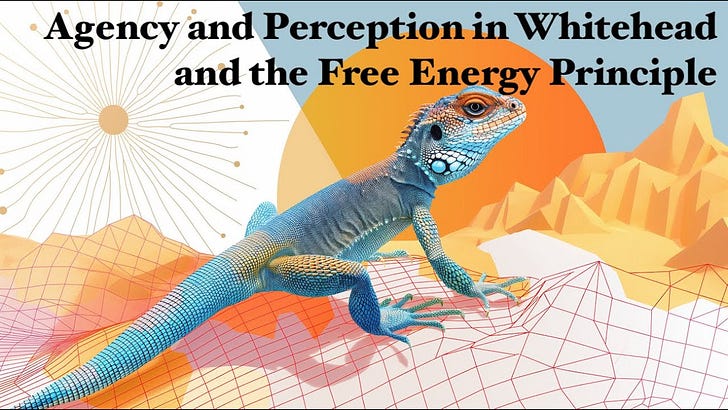Agency and Perception in Whitehead and the Free Energy Principle
Continuing my dialogues with Tim Jackson
Tim and I continue to explore how Whitehead's Philosophy of Organism might intersect with contemporary scientific theories, especially the Free Energy Principle (FEP). The FEP suggests that organisms strive to minimize the surprise of sensory inputs by adjusting their internal models of the world, which resonates in some ways with Whitehead's account of perception as the flip side of causation (he coins the term “prehension” to capture this novel view). This led us to ponder the dynamic interplay between internalist and externalist views of perception, proposing that an organism is inseparable from its environment. We discuss Whitehead’s statement that, for each conscious occasion of our experience, our body is just a particularly intimate part of the environment.
Whitehead lays out his theory of perception in the book Symbolism (1927). In short, Whitehead argues that our basal mode of perception is of causal efficacy, with sense perception (or what he calls “presentational immediacy”) being a derivative mode only available to complex organisms with developed sensory organs. Our normal perception occurs in the mixed mode he calls “symbolic reference,” which connects the vague but emotionally meaningful “time perception” of causal efficacy with the clear but barren “spatialized perception” of presentational immediacy.
We also delved into the challenges of differentiating between the living and non-living within a framework that views all entities as organic processes. Our conversation underscored the potential of Whitehead's process-oriented, organicist perspective to harmonize subjective experiences with objective scientific investigations.
We mention a paper critical of FEP by the philosopher Kate Nave, which you can read here: https://www.dialecticalsystems.eu/contributions/life-beyond-the-free-energy-principle-how-to-survive-without-invariance/




....continuation of first comment below which was truncated when it was edited... unexpected glitch, I think...
...one must turn to the phenomenological philosopher, Emmanuel Lévinas--but, while deeply important, that is far too large a tangent--although fundamentally important. This is covered some of those who are writing about 'semio-ethics'. Raghuveer & Endres criticize 'Bayesian Mechanics' and the FEP on the basis of what is implied in terms of metaphysics if it were to be true and accepted. What is implied, as is the case with most of the models that are brought forward by modern neuroscientists who see the 'hard problem' as eventually solvable, is a SUBSTANCE METAPHYSICS, which is basically anathema to anyone who believes that process is primary. Why? Because, as Raghuveer and Endres state:
'the theory... (ie. substance metaphysics offers) ...no resource to model novelty, growth, and development observed in human psychology.' And I would hasten to add--not only novelty, growth, and development in 'human psychology', but as features that are deep, foundational aspects of Nature. And then the authors go on to offer an alternative based on process metaphysics. Which is similar, I would argue, to the kind of evolutionary process metaphysics that Charles Sanders Peirce offered in a series of papers in 'The Monist' in the last decade of the 19th century, well over 100 years ago. Which raises the question: what is it going to take to get beyond the mechanistic formalism and its associated ontological implications--like the implications that result when one adopts a metaphysics based on 'stuff' rather than 'process'? I would humbly suggest a thorough reading and study of these two papers, both of which quote the fundamentally significant work of relational biologist, Robert Rosen, and some of the more recent extensions of this work that realize the true autopoietic nature of living organisms, as open systems that are closed to efficient causation. And which are necessarily self-referential and manifest the capacity to anticipate and act autonomously with purpose related to the biologically granted capacity to persist in their physical embodiment in the context of their species-specific ecological conditions, not as passive creatures, but as intentional agents who may even have the capacity to modify their ecological niche to some degree...https://onlinelibrary.wiley.com/doi/abs/10.1002/evan.21534 ....which is something that our species has taken to the point where it all appears to be backfiring on us.
Just a brief addition... yes, purposeful niche construction and the process of learning how to do it demonstrates how the learning of individual members of a species can influence the direction of evolution... and this adds to the argument that any model that does not adequately account for learning, growth, development, and adaptive agency of living organisms, doesn't really tell the full story... does it?
For example, see: https://nicheconstruction.com/#:~:text=Niche%20construction%20is%20the%20process,natural%20selection%20in%20their%20environments.